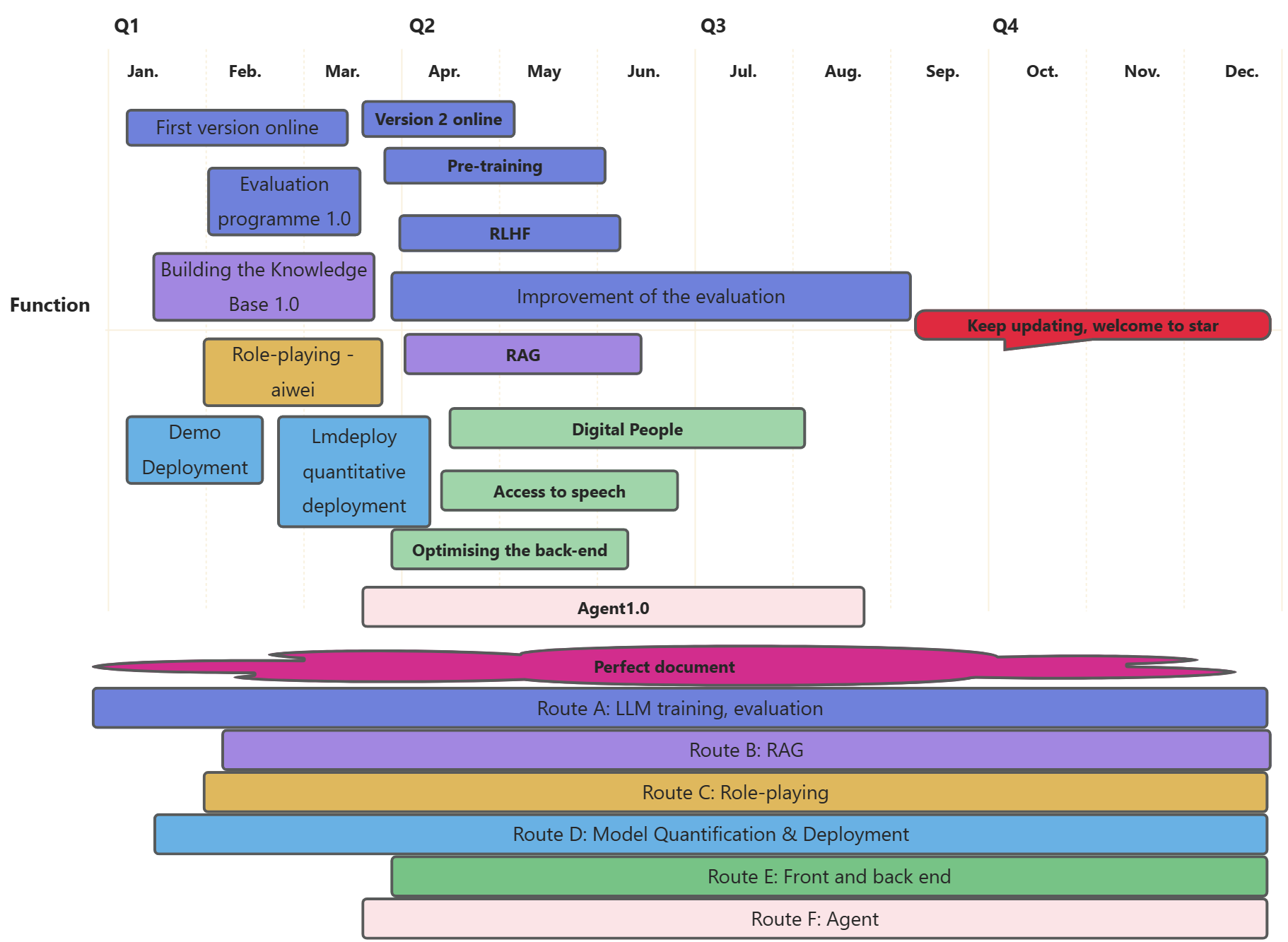13 KiB
EmoLLM - Large Languge Model for Mental Health
EmoLLM
简体中文 | English
Explore the documentation of this project »
View the Demo
·
Report a Bug
·
Propose a New Feature
EmoLLM is a series of large language models designed to understand, support and help customers in mental health counseling. It is fine-tuned from the LLM instructions. We really appreciate it if you can give it a star~⭐⭐. The open-sourced configuration is as follows:
| model | type |
|---|---|
| InternLM2_7B_chat | qlora |
| InternLM2_7B_chat | full finetuning |
| InternLM2_1_8B_chat | full finetuning |
| Qwen_7b_chat | qlora |
| Qwen1_5-0_5B-Chat | full finetuning |
| Baichuan2_13B_chat | qlora |
| ChatGLM3_6B | lora |
| DeepSeek MoE_16B_chat | qlora |
| Mixtral 8x7B_instruct | qlora |
| …… | …… |
| Everyone is welcome to contribute to this project ~ |
The Model is aimed at fully understanding and promoting the mental health of individuals, groups, and society. This model typically includes the following key components:
- Cognitive factors: Involving an individual's thought patterns, belief systems, cognitive biases, and problem-solving abilities. Cognitive factors significantly impact mental health as they affect how individuals interpret and respond to life events.
- Emotional factors: Including emotion regulation, emotional expression, and emotional experiences. Emotional health is a crucial part of mental health, involving how individuals manage and express their emotions and how they recover from negative emotions.
- Behavioral factors: Concerning an individual's behavior patterns, habits, and coping strategies. This includes stress management skills, social skills, and self-efficacy, which is the confidence in one's abilities.
- Social environment: Comprising external factors such as family, work, community, and cultural background, which have direct and indirect impacts on an individual's mental health.
- Physical health: There is a close relationship between physical and mental health. Good physical health can promote mental health and vice versa.
- Psychological resilience: Refers to an individual's ability to recover from adversity and adapt. Those with strong psychological resilience can bounce back from challenges and learn and grow from them.
- Prevention and intervention measures: The Mental Health Grand Model also includes strategies for preventing psychological issues and promoting mental health, such as psychological education, counseling, therapy, and social support systems.
- Assessment and diagnostic tools: Effective promotion of mental health requires scientific tools to assess individuals' psychological states and diagnose potential psychological issues.
Recent Updates
-
【2024.3.3】 Based on InternLM2-7B-chat full amount of fine-tuned version of open source, need two A100*80G, update professional evaluation, see evaluate, update PaddleOCR-based PDF to txt tool scripts, see scripts.
-
【2024.2.29】 Updated objective assessment calculations, see evaluate for details. A series of datasets have also been updated, see datasets for details.
-
【2024.2.27】 Updated English README and a series of datasets (licking dogs and one-round dialogue)
-
【2024.2.23】The "Gentle Lady Psychologist Ai Wei" based on InternLM2_7B_chat_qlora was launched. Click here to obtain the model weights, configuration file, online experience link
-
【2024.2.23】Updated several fine-tuning configurations, added data_pro.json (more quantity, more comprehensive scenarios, richer content) and aiwei.json (dedicated to the gentle lady role-play, featuring Emoji expressions), the "Gentle Lady Psychologist Ai Wei" is coming soon.
-
【2024.2.18】 The full fine-tuned version based on Qwen1_5-0_5B-Chat has been open-sourced. Friends with limited computational resources can now dive in and explore it.
View More
- 【2024.2.6】 Open-sourced based on the Qwen1_5-0_5B-Chat full-scale fine-tuned version, friends with limited computing power can start experimenting~
- 【2024.2.5】 The project has been promoted by the official WeChat account NLP Engineering. Here's the link to the article. Welcome everyone to follow!! 🥳🥳
- 【2024.2.3】 Project Vedio at bilibili 😊
- 【2024.1.27】 Complete data construction documentation, fine-tuning guide, deployment guide, Readme, and other related documents 👏
- 【2024.1.25】 Complete the first version of EmoLLM and deploy it online https://openxlab.org.cn/apps/detail/jujimeizuo/EmoLLM 😀
Roadmap
Contents
- EmoLLM - Large Languge Model for Mental Health
Pre-development Configuration Requirements.
- A100 40G (specifically for InternLM2_7B_chat + qlora fine-tuning + deepspeed zero2 optimization)
User Guide
- Clone the repo
git clone https://github.com/SmartFlowAI/EmoLLM.git
- Read in sequence or read sections you're interested in:
- File Directory Explanation
- Data Construction
- Fine-tuning Guide
- Deployment Guide
- View More Details
File Directory Explanation
├─assets:Image Resources
├─datasets:Dataset
├─demo:demo scripts
├─generate_data:Data Generation Guide
│ └─xinghuo
├─scripts:Some Available Tools
└─xtuner_config:Fine-tuning Guide
└─images
Data Construction
Please read the Data Construction Guide for reference.
The dataset used for this fine-tuning can be found at datasets
Fine-tuning Guide
For details, see the fine-tuning guide
Deployment Guide
For details, see the deployment guide
Additional Details
Frameworks Used
How to participate in this project
Contributions make the open-source community an excellent place for learning, inspiration, and creation. Any contribution you make is greatly appreciated.
- Fork the Project
- Create your Feature Branch (
git checkout -b feature/AmazingFeature) - Commit your Changes (
git commit -m 'Add some AmazingFeature') - Push to the Branch (
git push origin feature/AmazingFeature) - Open a Pull Request
Version control
This project uses Git for version control. You can see the current available versions in the repository.
Authors (in no particular order)
aJupyter@Datawhale member, Master's student at Nankai University
jujimeizuo@Master's student at Jiangnan University
Smiling&Weeping@Undergraduate student at Harbin Institute of Technology (Weihai)
ZhouXinAo@Master's student at Nankai University
MING_X @Undergraduate at Huazhong University of Science and Technology
Z_L@swufe
MrCatAI@AI Removal of Labour
ZeyuBa@Master's student at Institute of Automation
aiyinyuedejustin@Master's student at University of Pennsylvania
Nobody-ML@Undergraduate at China University of Petroleum (East China)
chg0901@PhD Candidate at Kwangwoon University
Mxoder@Undergraduate at Beihang University
Copyright Notice
The project is licensed under the MIT License. Please refer to the details LICENSE
Acknowledgments
- Sanbu
- Shanghai Artificial Intelligence Laboratory
- Vanin
- Bloom up (WeChat Official Account Promotion)
Star History
🌟 Contributors
Communication group
- If it fails, go to the Issue section.






